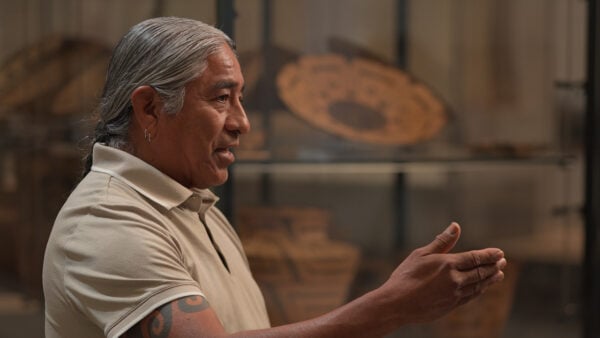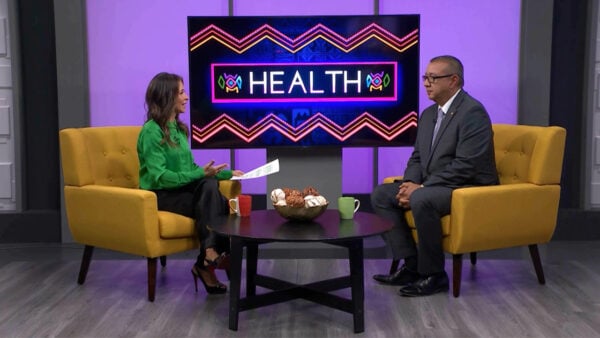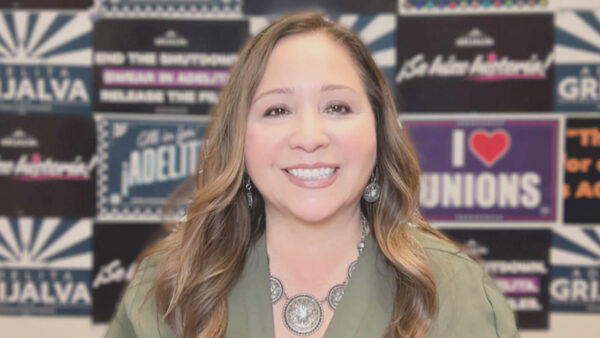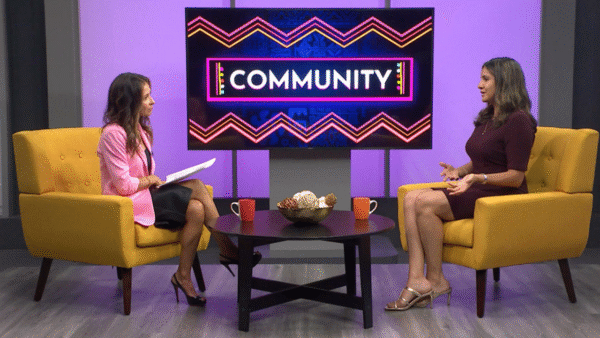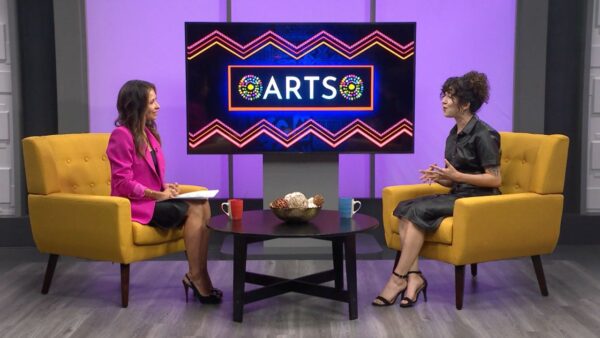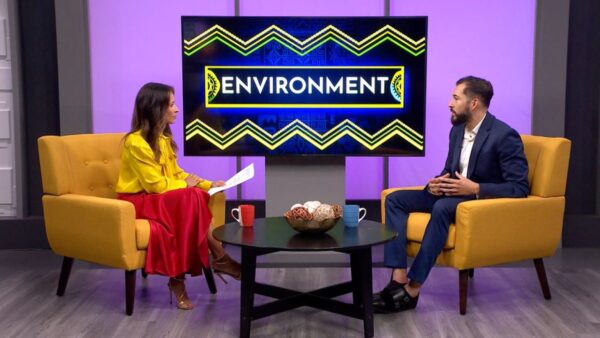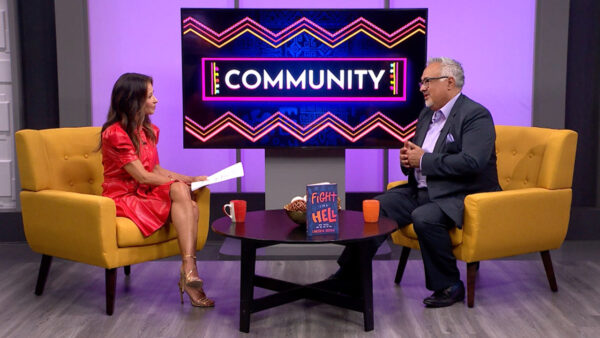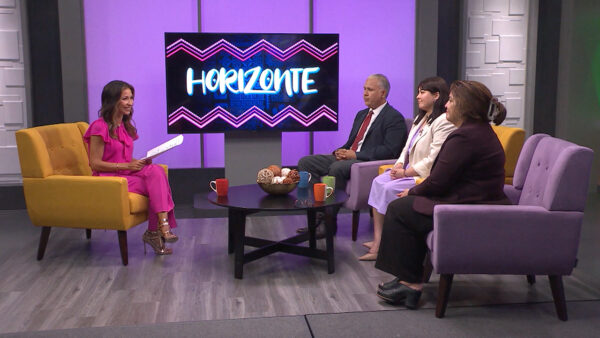Arturo Vargas, Executive Director of the National Association of Latino Elected Officials (NALEO), will talk about the role the Latino community will have in the 2012 fall elections, issues important to Hispanic voters and redistricting.
José Cárdenas: The National Association of Latino Elected and Appointed Officials known as NALEO encourages and assists Latinos in the political process. I recently had the opportunity to talk to Arturo Vargas, the executive director of NALEO about goals the organization has today, redistricting, the Latino vote, and other issues.
Jose Cardenas: Arturo, thanks for joining us on "Horizonte." There is lot to talk about. NALEO has been around for how long?
Arturo Vargas: 35 years in terms of the membership association. 30 years in terms of our non profit.
José Cárdenas: And you've been with them for 18 years.
Arturo Vargas: I have been there almost 18 years now.
José Cárdenas: So let's talk about briefly what NALEO is and get your sense of where it stands right now today.
Arturo Vargas: Well, I think the easiest thing to understand who we are, what we do, think of us as the league of women voters meets the U.S. conference of mayors. We're an organization devoted to making sure that Latinos participate in American democracy. We help people become citizens, get citizens to vote, everybody counted in the census, once Latinos and Latinas run for office we provide assistance and resources to them so they can be effective and we promote a policy agenda so that Latinos are able to have as few barriers as possible to participate in our political process.
José Cárdenas: And is membership opened to non-elected officials? The title suggests that that's what it is just elected officials.
Arturo Vargas: Membership is open to anybody who's willing to pay the due, $100 a month or $1,000 for lifetime membership. But really what it is, it's a network of Latino public servants, of those who want to work together, whether they serve on school boards or serve on councils or state legislatures, Republicans or democrat, Puerto Rican, Cuban, Central American, or Mexican American, the common agenda is we want more Latinos to participate in our politics, we want to move the country forward.
José Cárdenas: And how many Latino elected officials currently participate?
Arturo Vargas: There are about 5,800 Latinos in elected office today and I would say about 20% of them are active NALEO members. Many are not members because the dues actually are prohibitive, if you can believe that, because your average Latino official serves in a small community in a part-time position and they're holding a full-time job to try to fend for their family at the same time that they're actually devoting full time to their elected position.
José Cárdenas: And how do those numbers stack up in terms of the past for NALEO, both in terms of the number of elected officials total and the percentage that are members of your organization?
Arturo Vargas: Since we started, there were about 3,200 Latinos in elected office. Now, we have 5,800. So we have seen a significant increase. We have to keep in mind that that 5,800 is still only 1% of all the elected offices in the country. There are about half a million elected positions in the United States. We hold about 5,800. There's a great deal of work to be done. Most Latino elected officials represent a Latino majority jurisdiction or community. What we're starting to see more and more however are your crossover candidates. Latinos and Latinas that can run and be elected without relying exclusively on the Latino vote.
José Cárdenas: Are you starting to see more Republican candidates now that this last election has brought in Marco Rubio, the governors of New Mexico and other states who were Latinos, Ryan Sandoval in Nevada?
Arturo Vargas: 2010 was a breakthrough year for Latino Republicans. We saw more than a doubling of the number of Republicans in the Congress, for example. We went from three to seven and a U.S. senator. And I think part of that is that the Latinos who ran as Republicans were in the right place at the right time for the 2010 election. Overall, those Latinos who serve in partisan offices, about 90% are democrat and 10% for Republicans. So keep in mind that the vast majority of Latinos in elected office, about 75% of them serve a nonpartisan office, school boards, city council, county boards of commissions where you don't declare a party to be a candidate.
José Cárdenas: And those who are partisan office holders, do they participate in the organization, the Republican Latino office holders?
Arturo Vargas: They do. And our bylaws require that not only we be nonpartisan but that we make sure that the leadership of the organization is nonpartisan. So our membership board, which is made up of 28 board members, presently has seven Republicans, our nonprofit board which is made of 15 board members is led --- our chairman who is a Republican who is a former state legislator from Florida.
José Cárdenas: And what about the high-profile Latinos I mentioned? Are they participating?
Arturo Vargas: Marco Rubio when he was speaker of the house in Florida was an active member of NALEO. We gave him an award for the Edward R Roybal Award named after our founder for outstanding public service given what he had been doing in the state house of Florida. We expect that he will be with us in June of this year when we take the NALEO national conference back to Florida to Orlando June 21st and 23rd.
José Cárdenas: His name, of course, has been mentioned prominently as a possible vice presidential candidate on the ticket. Ryan Sandoval also says Martinez in New Mexico. Your organization is involved on the national issues, bipartisan but you don't get the attention that I think you and others believe is merited from the candidate. Has there been an issue from President Obama for example?
Arturo Vargas: There has been and a lot of it has to do with the timing of elections and I think the way we set up our system in terms of the primary system, the electoral colleges all has its advantages and disadvantages. In 2007, when we last met in Florida we had eight candidates for the presidency appearing before our constituency. In 2008, we had both senators Barack Obama and John McCain speak to our constituency. Now, I have full confidence that in 2012, President Obama will come back and we'll do all we can to make sure that either governor Romney or senator Santorum or speaker Gingrich, whomever is the presented GOP nominee, also joins us.
José Cárdenas: President Obama had promised to come back sooner than his next re-election campaign and that's been a sore spot.
Arturo Vargas: Well, it has been. We have been working with the White House every year, reminding the White House not just of the president's commitment but of the importance that any president has of meeting to work with the NALEO constituents. If you're going to lead this country, and move the country forward, you need to work with the men and women at the front lines of America's challenges. The men and women who are running American cities, school boards, state legislatures, the people who are making the budget cuts at the local level, cutting classes, raising tuitions, cutting city services. We need the President of the United States to work with the people at the front lines. And that's where the NALEO members are.
José Cárdenas: Whether it's the democratic candidates or the Republican candidates, there is this sense that Latinos matter to them only every four years. How do you deal with that?
Arturo Vargas: What we try to do is to remind them that Latinos matter in every single election. Elections are held every year in this country, not just every two or four years. Let's take a look at 2010, the last national election. Latinos had an impact both on candidates and voters. As candidates as we discussed, historic gains, the governorship of Nevada, governorship of Florida, United States senator out of Florida, the governorship of New Mexico. In terms of voters, Latino voters made the difference for candidates running for the Senate in Colorado, in Nevada, and the entire state of California.
José Cárdenas: This election, is the Latino vote as a practical matter in play? The Republican candidates ironically with the exception of Newt Gingrich have come across as very anti-immigrant, or anti-Latino and presumably it's going to be hard for them to make that up once we get to the general. On the other flip side, well President Obama may not have paid as much attention as he should have and while he's been faulted for not securing the enactment of the dream act, the question is what's the alternative?
Arturo Vargas: I think what happens in these primary races and the system we have for electing a president is that candidates in the primaries run to the extreme of their party and when it comes time to run in November, they come back to the center and that really is where the Latino community is. We are in the center, we are a swing vote. I think you'll see much of the rhetoric change once we get past the conventions and the two candidates focus on what's it going to take to win the presidency? There will be several states in play that either candidate will need to win the White House. States like Florida, Colorado, New Mexico, and Nevada. Those first states alone, you need to win to win the president and in those first states alone, you can't win if you don't carry the Latino vote.
José Cárdenas: What are the principal policy issues for your organization that a candidate, Republican or democrat, would have to endorse to be able to secure the Latino vote? In your judgment.
Arturo Vargas: Well, for our organization, we want to make sure that we have a democracy that works, that thrives, where Latinos fully participate. If you ask the Latino voter what's important to them today, they're going to say jobs and the economy. They're going to say access to healthcare, education, the need for immigration reform, many of the same issues that time rest of America cares about. Bottom line, Latinos care about the economy and jobs. Latino families have suffered the most in this recession, suffered the most from the foreclosure crisis. We need to make sure that we have an economic agenda that includes Latinos.
Jose Cardenas: So do you think a Republican candidate who is viewed as anti-immigrant can never secure the Latino vote if they come across strong on economic issues?
Arturo Vargas: Being anti-immigrant runs a real risk for any candidate, Republican or democrat. And we see examples of that time and time again when candidates have tried to run to the right or scapegoat immigrants to their detriment. That has been the legacy of what Pete Wolfson did in California in the early 1990s and as recently as 2010, meg Whitman when she tried to run for governor and lost because she went to the right on immigration. I think anybody who does that runs that risk. Now, it's not so much that immigration is the most important issue for Latino voters. I think what really matters is how you talk about immigration, how you talk about immigrants, and their role in America. Because that's what all of us care about, whether we're born here or not, we all know somebody who's an immigrant. All of us in America come from immigrant families. How you talk about immigration I think is really what has an effect on a propensity of Latinos.
Jose Cardenas: Let's talk about the tone of that discussion because Arizona, as you know, has been ground zero, it's been described that way on the immigration debate and everything else having to do with immigrants. What have you learned from how those issues have played out in Arizona that is applicable to the rest of the country?
Arturo Vargas: Well, you're right, Arizona is ground zero. California was ground 018 years ago in 1994, proposition 187. I'm hoping that what we saw happen in California will happen in Arizona. After prop 187 in California, many Latino legal permanent residents decided to become U.S. citizens because they wanted to have a voice in elections and many Latinos who would otherwise not have voted have been engaged in the political process. It was a mission for them to get involved because they wanted to have a say. We're hoping we'll see the same kind of dynamic in Arizona that will motivate and encourage permanent residents to become U.S. citizens and U.S. citizens, those born here, to engage in the political process. The fact is we project 359,000 Latinos will vote in Arizona in November. That's out of nearly 700,000 Latinos who can vote in November in Arizona. We need to increase our participation in the electoral process.
Jose Cardenas: Despite what many view as the negative consequences of the impact on Arizona of SB 1070 and other anti-immigrant pleasures, you have legislatures in other states, many other states, trying to do the same thing, Alabama being the most prominent. So what does that signal to an organization like yours in terms of your effectiveness?
Arturo Vargas: Well, what it really does signal is that we're starting to have an impact. Many of these laws, SB 1070, the Alabama law, and the voluntary id laws that are requiring people to prove their citizenship, all of them really are a reaction to now Latinos having an impact on the political process. I see them as nothing more than an effort to slow down the integration of Latinos into American democracy. We have to fight that because there's nothing more un-American than to put restrictions on a person's ability to vote, on a citizen's ability to vote. And that's what's happening in this country. And we as American citizens need to stand up and say that is not the intention of this country to prohibit somebody from participation.
Jose Cardenas: An issue closely related to voter I.D. laws is redistricting. I know your organization is involved in some of those battles.
Arturo Vargas: We've been involved in this process of redistricting. I actually began -- we ran a huge campaign in 2010 of its time, make yourself count, to encourage every single Latino living in this country to be counted in the census. 50.5 million Latinos were counted in 2010. That's a pretty big number. It's more than what the bureau expected. The next step was to convert those numbers to political force, redistricting. In Arizona, there's a commission that has been drawing the lines as in Colorado and California. In November, in Texas and in Florida, which have huge stakes with the Latino committee because each of those three states gained members of Congress because they gained so much Latino population. We've been working with the community to see if we could draw these lines in a way to create more districts so Latinos can elect senators of choice. In Nevada, there will be a new Latino district. In Florida, there will be a new Latino-influenced district in the central part of the state where Orlando and Tampa are. Now, Texas once the courts are done with it it appears there will be two new Latino opportunity districts, meaning where Latinos will be able to select candidates of their choice.
Jose Cardenas: A lot of opportunities in the future it sounds like and we do appreciate you joining us to talk about all of that. Thank you so much.
Jose Cardenas: That's our show for tonight, from all of us here at "Horizonte." I'm José Cárdenas. Have a good evening.
Arturo Vargas:Executive Director, National Association of Latino Elected Officials (NALEO);
